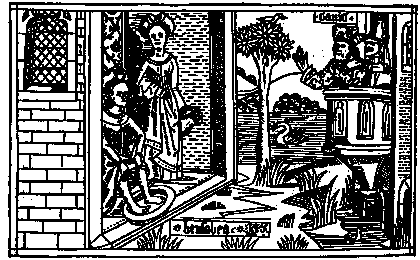and History
 THE LOUSE IS FOREMOST among the many important and dignified things that are made the subjects of raucous humor by the ribald. Despite the immense influence of this not unattractive insect upon the history of mankind, it is given, in the Encyclopædia Britannica two thirds of a column --- half as much as is devoted to "Louth, a maritime county in the province of Loinster," one fifth as much as is allowed for Louisville, Kentucky. This creature, which has carried the pestilence that has devastated cities, driven populations into exile, turned conquering armies into panic-stricken rabbles is briefly dismissed as "a wingless insect, parasitic upon birds and mammals, and belonging, strictly speaking, to the order of Anoplura."
THE LOUSE IS FOREMOST among the many important and dignified things that are made the subjects of raucous humor by the ribald. Despite the immense influence of this not unattractive insect upon the history of mankind, it is given, in the Encyclopædia Britannica two thirds of a column --- half as much as is devoted to "Louth, a maritime county in the province of Loinster," one fifth as much as is allowed for Louisville, Kentucky. This creature, which has carried the pestilence that has devastated cities, driven populations into exile, turned conquering armies into panic-stricken rabbles is briefly dismissed as "a wingless insect, parasitic upon birds and mammals, and belonging, strictly speaking, to the order of Anoplura."
The louse shares with us the misfortune of being prey to the typhus virus. If lice can dread, the nightmare of their lives is the fear of someday inhabiting an infected rat or human being. For the host may survive; but the ill-starred louse that sticks his haustellumthrough an infected skin, and imbibes the loathsome virus with his nourishment, is doomed beyond succor. In eight days, he sickens, in ten days he is in extremis, on the eleventh or twelfth his tiny body turns red with blood extravasated from his bowel, and he gives up his little ghost.
Man is too prone to look upon all nature through his egocentric eyes. To the louse, we are the dreaded emissaries of death. He leads a relatively harmless life --- the result of centuries of adaptations; then, out of the blue, an epidemic occurs; his host sickens, and the only world he has ever known becomes pestilential and deadly; and if, as a result of circumstances not under his control, his stricken body is transferred to another host whom he, in turn, infects. He does so without guile, from the uncontrollable need for nourishment, with death already in his own entrails. If only for his fellowship with us in suffering, he should command a degree of sympathetic consideration. The louse was not always the dependent, parasitic creature that cannot live away from its host. There were once free and liberty-loving lice, who could took other insects in their multifaceted eyes and bid them smile when they called them "louse." But this was even longer ago than the Declaration of Independence, for it took the louse many centuries to yield up its individualism... However this may be, it is likely from evidence that, somewhere in the legendary past of louse history, an offspring of a free-living form not unlike our book louse found that life could be infinitely simplified if, instead of having to grub for food in straw, under tree barks, in moss or lichen, in decaying cereals and vegetables, it could attach itself to some food-supplying host, and sit tight. It is one of the few instances in which nature seems extremely logical in its processes. The louse sacrifices a liberty that signifies chiefly the necessity for hard work, the uncertainty of food and shelter, and exposure to dangers from birds, lizards, and frogs; loses the fun of having wings, perhaps; but achieves, instead, a secure and effortless existence on a living island of plenty. In a manner, therefore, by adapting itself to parasitism, the louse has attained the ideal of bourgeois civilization, though its methods are more direct than those of business or banking, and its source of nourishment is not its own species.